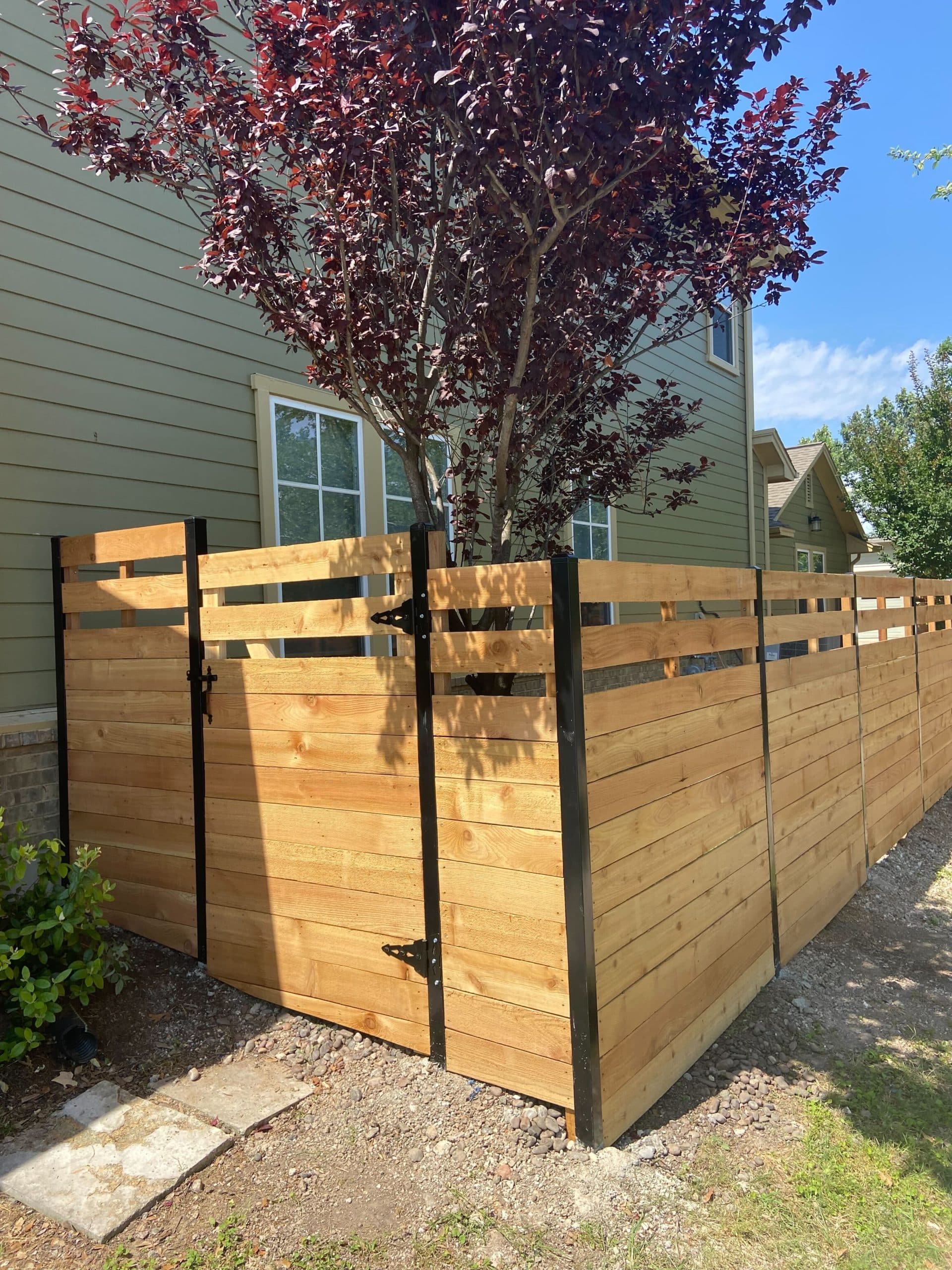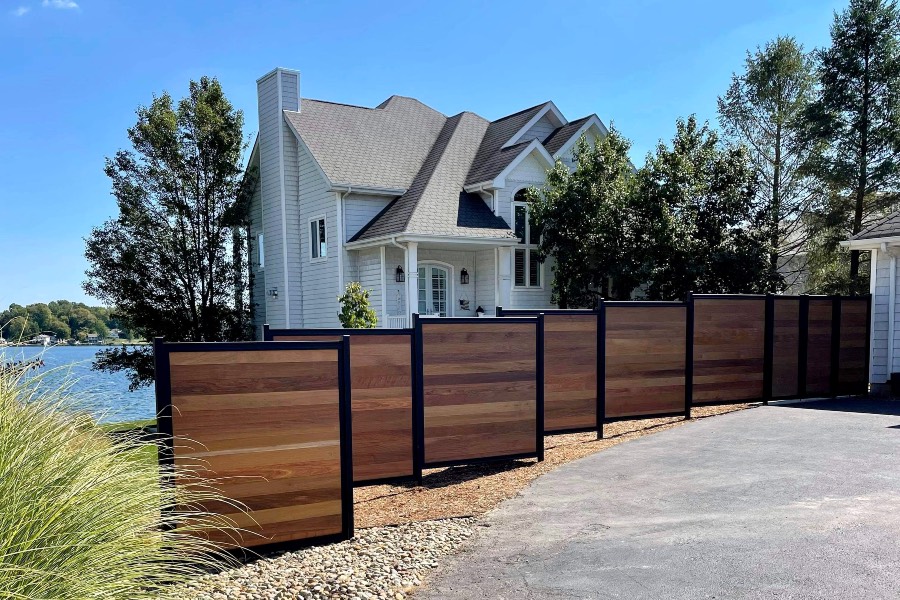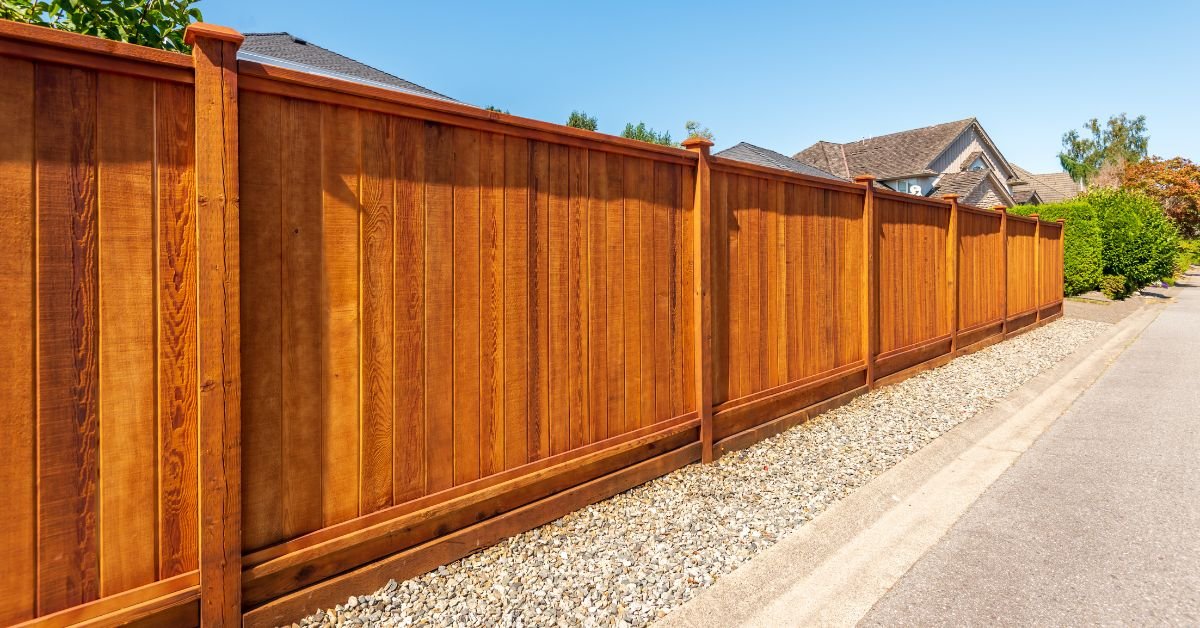All Categories
Featured
When picking a fencing for your home, it's vital to take into consideration variables like price, sturdiness, upkeep, and visual charm. 3 of the most popular products for property and business fences are aluminum, wood, and plastic. Each offers one-of-a-kind benefits and some disadvantages, making it vital to review your requirements prior to deciding. Below, we compare the pros and cons of these products to help assist your option.
Wood Fence. Pros:
![]()
Natural Visual: Timber fencings are known for their timeless, all-natural appearance. They can quickly mix right into the majority of landscapes and enhance the appeal of your home or service. Whether you're going for a rustic appearance or a more refined finish, wood can be personalized with paint, tarnish, or sealant. Customization: Timber is just one of one of the most versatile products, permitting a variety of styles, such as picket fencings, privacy fencings, and ranch-style enclosures. It's very easy to change the design to fit the certain demands of your residential property. Inexpensive: Usually, timber fences come at a reduced first price compared to vinyl or light weight aluminum, making them an affordable alternative for those on a budget plan. Disadvantages:
Upkeep Needs: Wood fences call for normal upkeep to preserve their appeal and functionality. This consists of discoloration or paint to safeguard versus rot, termites, and climate damages. Without appropriate care, wood can deteriorate with time. Much Shorter Life-span: Compared to plastic or aluminum, wood fences tend to have a much shorter life expectancy, specifically in areas with extreme climate. Rough problems, such as hefty rain, moisture, or snow, can trigger timber to weaken quicker. Prone to Damages: Wood fencings are susceptible to damage from bugs, consisting of termites, in addition to all-natural wear from weather condition. They might likewise warp or fracture if not properly preserved. Vinyl Fence. Pros:
Reduced Maintenance: Among the primary benefits of vinyl fencings is that they require very little maintenance. Unlike timber, plastic does not need to be painted, secured, or discolored. It's resistant to fading, staining, and splitting, which saves money and time on upkeep. Resilience: Vinyl is understood for its capability to stand up to severe weather problems without wearing away. It's unsusceptible pests like termites, and its resistance to dampness and UV rays ensures it continues to be looking helpful for years. Long-Lasting: A plastic fence can last approximately 30 years or more, making it an excellent long-term investment. Lots of manufacturers supply guarantees, further boosting its worth. Variety of Styles: Vinyl fencings are available in different shades and styles, consisting of those that resemble timber. You can select from privacy, picket, or attractive designs, providing adaptability to match your home or organization. Disadvantages:
![]()
Greater Upfront Cost: Plastic fencings tend to have a higher first price than wood. While the lasting financial savings on maintenance are substantial, the in advance financial investment might be a deterrent for some home owners. Restricted Personalization: Plastic fences been available in standard styles, and while colors and designs are different, you may not have as much flexibility for modification contrasted to timber. Cracking in Cold Climates: While vinyl is resilient, in incredibly chilly climates, it can come to be fragile and crack upon impact, which might be bothersome in areas with severe winter seasons. Light weight aluminum Fencing. Pros:
Reduced Maintenance: Light weight aluminum fences are understood for their low-maintenance requirements. Unlike timber, aluminum doesn't corrosion or wear away, and it does not require to be painted or sealed. This makes it a fantastic choice for those that want an easy option. Resilience and Stamina: Light weight aluminum is a durable material that stands well to rough weather condition problems. It's an exceptional choice for coastal locations where deep sea corrosion is a concern, as it's resistant to rust. Visual Appeal: Light weight aluminum fencings use a tidy, stylish look, frequently used for attractive objectives. They're readily available in various designs, consisting of decorative layouts, and can add a premium feel to your residential or commercial property. Safety and security: Aluminum fences are long lasting and deal terrific protection, particularly when installed with locks or gateways. Their durable building and construction offers a dependable obstacle versus unwanted access. Cons:
![]()
Higher First Cost: Aluminum fences tend to be a lot more expensive than timber, particularly if you go with attractive styles. The ahead of time cost may be excessive for some. Much Less Privacy: Aluminum fences normally have broader voids between the slats, which suggests they give less privacy than timber or plastic fences. If privacy is a top priority, aluminum may not be the finest option. Denting Problems: While aluminum is rust-resistant, it is at risk to flexing or nicking if struck with force. For instance, a lorry crash or heavy influence can cause lasting damages to the fence. Which Fence Product is Right for You? Picking the ideal fence depends upon a number of variables, including your budget plan, style choices, maintenance capacity, and the atmosphere in which you live. If you want a natural appearance and are planned for regular upkeep, timber may be the right choice. If low-maintenance and long life are your concerns, vinyl is a terrific selection. For those who like a smooth, modern-day appearance with minimal treatment, light weight aluminum uses a lasting, secure remedy.
Eventually, each fencing material has its disadvantages and pros, so it is necessary to evaluate what matters most for your particular requirements. Consider the environment, the degree of privacy you need, and just how much upkeep you agree to devote to, and you'll locate the perfect fencing for your building.
Wood Fence. Pros:

Natural Visual: Timber fencings are known for their timeless, all-natural appearance. They can quickly mix right into the majority of landscapes and enhance the appeal of your home or service. Whether you're going for a rustic appearance or a more refined finish, wood can be personalized with paint, tarnish, or sealant. Customization: Timber is just one of one of the most versatile products, permitting a variety of styles, such as picket fencings, privacy fencings, and ranch-style enclosures. It's very easy to change the design to fit the certain demands of your residential property. Inexpensive: Usually, timber fences come at a reduced first price compared to vinyl or light weight aluminum, making them an affordable alternative for those on a budget plan. Disadvantages:
Upkeep Needs: Wood fences call for normal upkeep to preserve their appeal and functionality. This consists of discoloration or paint to safeguard versus rot, termites, and climate damages. Without appropriate care, wood can deteriorate with time. Much Shorter Life-span: Compared to plastic or aluminum, wood fences tend to have a much shorter life expectancy, specifically in areas with extreme climate. Rough problems, such as hefty rain, moisture, or snow, can trigger timber to weaken quicker. Prone to Damages: Wood fencings are susceptible to damage from bugs, consisting of termites, in addition to all-natural wear from weather condition. They might likewise warp or fracture if not properly preserved. Vinyl Fence. Pros:
Reduced Maintenance: Among the primary benefits of vinyl fencings is that they require very little maintenance. Unlike timber, plastic does not need to be painted, secured, or discolored. It's resistant to fading, staining, and splitting, which saves money and time on upkeep. Resilience: Vinyl is understood for its capability to stand up to severe weather problems without wearing away. It's unsusceptible pests like termites, and its resistance to dampness and UV rays ensures it continues to be looking helpful for years. Long-Lasting: A plastic fence can last approximately 30 years or more, making it an excellent long-term investment. Lots of manufacturers supply guarantees, further boosting its worth. Variety of Styles: Vinyl fencings are available in different shades and styles, consisting of those that resemble timber. You can select from privacy, picket, or attractive designs, providing adaptability to match your home or organization. Disadvantages:

Greater Upfront Cost: Plastic fencings tend to have a higher first price than wood. While the lasting financial savings on maintenance are substantial, the in advance financial investment might be a deterrent for some home owners. Restricted Personalization: Plastic fences been available in standard styles, and while colors and designs are different, you may not have as much flexibility for modification contrasted to timber. Cracking in Cold Climates: While vinyl is resilient, in incredibly chilly climates, it can come to be fragile and crack upon impact, which might be bothersome in areas with severe winter seasons. Light weight aluminum Fencing. Pros:
Reduced Maintenance: Light weight aluminum fences are understood for their low-maintenance requirements. Unlike timber, aluminum doesn't corrosion or wear away, and it does not require to be painted or sealed. This makes it a fantastic choice for those that want an easy option. Resilience and Stamina: Light weight aluminum is a durable material that stands well to rough weather condition problems. It's an exceptional choice for coastal locations where deep sea corrosion is a concern, as it's resistant to rust. Visual Appeal: Light weight aluminum fencings use a tidy, stylish look, frequently used for attractive objectives. They're readily available in various designs, consisting of decorative layouts, and can add a premium feel to your residential or commercial property. Safety and security: Aluminum fences are long lasting and deal terrific protection, particularly when installed with locks or gateways. Their durable building and construction offers a dependable obstacle versus unwanted access. Cons:

Higher First Cost: Aluminum fences tend to be a lot more expensive than timber, particularly if you go with attractive styles. The ahead of time cost may be excessive for some. Much Less Privacy: Aluminum fences normally have broader voids between the slats, which suggests they give less privacy than timber or plastic fences. If privacy is a top priority, aluminum may not be the finest option. Denting Problems: While aluminum is rust-resistant, it is at risk to flexing or nicking if struck with force. For instance, a lorry crash or heavy influence can cause lasting damages to the fence. Which Fence Product is Right for You? Picking the ideal fence depends upon a number of variables, including your budget plan, style choices, maintenance capacity, and the atmosphere in which you live. If you want a natural appearance and are planned for regular upkeep, timber may be the right choice. If low-maintenance and long life are your concerns, vinyl is a terrific selection. For those who like a smooth, modern-day appearance with minimal treatment, light weight aluminum uses a lasting, secure remedy.
Eventually, each fencing material has its disadvantages and pros, so it is necessary to evaluate what matters most for your particular requirements. Consider the environment, the degree of privacy you need, and just how much upkeep you agree to devote to, and you'll locate the perfect fencing for your building.
Latest Posts
Learn How WyHy Federal Credit Union Maximizes Your Savings on Borrowing and Banking
Published May 27, 25
1 min read
Improve Your Home's Exterior with Weathercraft's Exterior siding Solutions
Published May 25, 25
1 min read
Unlock WyHy FCU – Key Advantages for Your Future
Published May 25, 25
1 min read